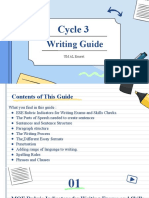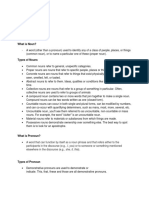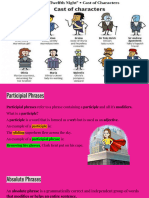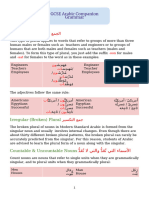0 ratings0% found this document useful (0 votes)
22 viewsW
W
Uploaded by
hihi1. The document provides definitions and examples of key parts of English grammar including the subject and predicate, parts of speech like nouns, verbs, adjectives, adverbs, conjunctions, prepositions, and interjections.
2. It also discusses sentence types such as declarative, interrogative, imperative, and exclamatory sentences and how they are punctuated.
3. Verb tenses are also briefly covered including present, past, and future along with variations like present continuous and past perfect. The document aims to provide basic English grammar notes to help answer questions.
Copyright:
© All Rights Reserved
Available Formats
Download as DOCX, PDF, TXT or read online from Scribd
W
W
Uploaded by
hihi0 ratings0% found this document useful (0 votes)
22 views2 pages1. The document provides definitions and examples of key parts of English grammar including the subject and predicate, parts of speech like nouns, verbs, adjectives, adverbs, conjunctions, prepositions, and interjections.
2. It also discusses sentence types such as declarative, interrogative, imperative, and exclamatory sentences and how they are punctuated.
3. Verb tenses are also briefly covered including present, past, and future along with variations like present continuous and past perfect. The document aims to provide basic English grammar notes to help answer questions.
Original Title
w
Copyright
© © All Rights Reserved
Available Formats
DOCX, PDF, TXT or read online from Scribd
Share this document
Did you find this document useful?
Is this content inappropriate?
1. The document provides definitions and examples of key parts of English grammar including the subject and predicate, parts of speech like nouns, verbs, adjectives, adverbs, conjunctions, prepositions, and interjections.
2. It also discusses sentence types such as declarative, interrogative, imperative, and exclamatory sentences and how they are punctuated.
3. Verb tenses are also briefly covered including present, past, and future along with variations like present continuous and past perfect. The document aims to provide basic English grammar notes to help answer questions.
Copyright:
© All Rights Reserved
Available Formats
Download as DOCX, PDF, TXT or read online from Scribd
Download as docx, pdf, or txt
0 ratings0% found this document useful (0 votes)
22 views2 pagesW
W
Uploaded by
hihi1. The document provides definitions and examples of key parts of English grammar including the subject and predicate, parts of speech like nouns, verbs, adjectives, adverbs, conjunctions, prepositions, and interjections.
2. It also discusses sentence types such as declarative, interrogative, imperative, and exclamatory sentences and how they are punctuated.
3. Verb tenses are also briefly covered including present, past, and future along with variations like present continuous and past perfect. The document aims to provide basic English grammar notes to help answer questions.
Copyright:
© All Rights Reserved
Available Formats
Download as DOCX, PDF, TXT or read online from Scribd
Download as docx, pdf, or txt
You are on page 1of 2
Subject and Predicate:
An adverb is a word that describes or
modifies a verb, adjective, or another
Every sentence consists of two main
adverb.
parts: the subject and the predicate.
Adverbs often answer questions like
The subject is what the sentence is
"How?" "When?" "Where?" or "To what
about; it usually contains a noun or a
extent?"
pronoun.
Pronoun:
The predicate contains the verb and
describes what the subject is doing or
what is happening.
A pronoun is a word used to replace a
Parts of Speech: noun to avoid repetition.
Examples include he, she, it, they, we,
etc.
Noun:
Conjunction:
A noun is a word that represents a
person, place, thing, or idea. A conjunction is a word that connects
words, phrases, or clauses within a
Nouns can be classified as common
sentence.
(general nouns) or proper (specific
names). Common conjunctions include and, but,
or, nor, for, so, and yet.
Verb:
Preposition:
A verb is a word that expresses an
action or a state of being. A preposition is a word that shows the
relationship between a noun or pronoun
Verbs can be categorized into action
and other words in a sentence.
verbs, linking verbs, and helping verbs.
Examples include in, on, under, above,
Adjective:
beside, between, etc.
Interjection:
An adjective is a word that describes or
modifies a noun.
An interjection is a word or phrase used
Adjectives answer questions like "What
to express strong emotion or sudden
kind?" "How many?" or "Which one?"
exclamations.
Adverb:
Examples include wow, oh, ouch, alas, An exclamatory sentence expresses
etc. strong emotion and ends with an
exclamation mark.
Tenses:
Example: What a beautiful sunset!
These are some basic English grammar
Verbs can be conjugated in different
notes to get you started. If you have
tenses to indicate when an action takes
specific questions or need more in-
place.
depth explanations on any topic, feel
Common tenses include present, past, free to ask.
and future, as well as their variations
like present continuous, past perfect,
etc.
Sentence Types:
Declarative Sentence:
A declarative sentence makes a
statement and ends with a period.
Example: She is going to the store.
Interrogative Sentence:
An interrogative sentence asks a
question and ends with a question mark.
Example: Are you coming with us?
Imperative Sentence:
An imperative sentence gives a
command or makes a request and ends
with a period or exclamation mark.
Example: Please pass the salt.
Exclamatory Sentence:
You might also like
- It's Grammar Time Is A Series of Four Grammar Books in Full: Key FeaturesDocument10 pagesIt's Grammar Time Is A Series of Four Grammar Books in Full: Key FeaturesДмитрий Онищенко0% (4)
- A Typology of English Texts : Douglas BiberDocument42 pagesA Typology of English Texts : Douglas BiberAbrahamNo ratings yet
- Purposive Communication.Document8 pagesPurposive Communication.Kyla Ramos Diamsay100% (1)
- Writing Skills PptDocument19 pagesWriting Skills Pptkimchaeyong07No ratings yet
- Writing GuideDocument86 pagesWriting GuideSedra Mousa Al Samara mousa almokdad Almokdad al samara100% (1)
- 4. Parts of SpeechDocument20 pages4. Parts of Speech241840018No ratings yet
- Notes Part of SpeechDocument11 pagesNotes Part of SpeechNurin Adleena AdamulhaszaNo ratings yet
- PPT KEL 1 B INGRISDocument14 pagesPPT KEL 1 B INGRISsabilaNo ratings yet
- Nur Anisah (1910117220031) - INT MEDIA A2 - PPTDocument16 pagesNur Anisah (1910117220031) - INT MEDIA A2 - PPTSupernisahNo ratings yet
- English 10 Parts of Speech Flashcards - Quizlet PDFDocument6 pagesEnglish 10 Parts of Speech Flashcards - Quizlet PDFJustice Merville100% (1)
- Lesson 8. Lexical Categories Introduction DiscussionDocument6 pagesLesson 8. Lexical Categories Introduction DiscussionColleen CastueraNo ratings yet
- El 11Document5 pagesEl 11Krissa Jean KingNo ratings yet
- What Is Noun?Document4 pagesWhat Is Noun?Christian GarciaNo ratings yet
- Syntax: Group 5Document36 pagesSyntax: Group 5Aneu DamayantiNo ratings yet
- Eng Lang 1Document52 pagesEng Lang 1cringerNo ratings yet
- Basics of GrammarDocument15 pagesBasics of GrammarulalaNo ratings yet
- A. Noun: Proper Nouns Are The Names of Individual People, Places, Titles, Calendar Times, EtcDocument44 pagesA. Noun: Proper Nouns Are The Names of Individual People, Places, Titles, Calendar Times, EtcAnonymous 1cCIhqNo ratings yet
- Grammar GlossaryDocument12 pagesGrammar GlossaryJoacoo RodolicoNo ratings yet
- Eight Parts of Speech Lesson PlanDocument4 pagesEight Parts of Speech Lesson PlanRogelyn Rendoque100% (1)
- Parts of SpeechDocument19 pagesParts of Speechzafar iqbalNo ratings yet
- Parts of SpeechDocument12 pagesParts of Speechsofija manaievaNo ratings yet
- The Eight Parts of SpeechDocument2 pagesThe Eight Parts of SpeechTin ListancoNo ratings yet
- Minimalist White and Gray Parts of SpeechDocument11 pagesMinimalist White and Gray Parts of SpeechKHRISSYL ANN SOLIDONo ratings yet
- Presentation Parts of Speech 1456425302 129863Document10 pagesPresentation Parts of Speech 1456425302 129863harshilguptaNo ratings yet
- Parts of SpeechDocument19 pagesParts of Speechleona dao100% (4)
- Basic Grammar and StructureDocument3 pagesBasic Grammar and StructureYeni LampungNo ratings yet
- Lexical vs. Auxiliary: Richard NordquistDocument4 pagesLexical vs. Auxiliary: Richard NordquistFitria IstiqomahNo ratings yet
- Introduction To Parts of SpeechDocument10 pagesIntroduction To Parts of SpeechiDanesh OnlineNo ratings yet
- Part of SpeechDocument4 pagesPart of SpeechJibran AyazNo ratings yet
- Parts of Speec1Document1 pageParts of Speec1jasminespalmadobcc26No ratings yet
- Week 9 Grammar in ContextDocument36 pagesWeek 9 Grammar in ContextAina MasriNo ratings yet
- Sentence AnalysisDocument32 pagesSentence AnalysisSPECIFIED With SIMFLIFICATIONNo ratings yet
- Glossary Grammar TermsDocument2 pagesGlossary Grammar TermsMahmoudNo ratings yet
- Parts of SpeechDocument10 pagesParts of SpeechMothNo ratings yet
- MahinDocument88 pagesMahinMashuk Jahir100% (1)
- The Simple Sentence: Parts of Speech Sentence AnalysisDocument7 pagesThe Simple Sentence: Parts of Speech Sentence AnalysismiriamacunaNo ratings yet
- Crash Course - Final SyllabusDocument32 pagesCrash Course - Final SyllabusynrNo ratings yet
- Untitled PresentationDocument17 pagesUntitled Presentationpuzzlingsky6647No ratings yet
- Topic Sentence by Group 4Document10 pagesTopic Sentence by Group 4Nurul Aini SavitriNo ratings yet
- 8 Parts of SpeechDocument3 pages8 Parts of Speechanon-188080100% (2)
- Reporting EL102Document36 pagesReporting EL102Rojane mae BangcoreNo ratings yet
- Parts of Speech L 4Document24 pagesParts of Speech L 4Aikokul ArgenNo ratings yet
- Functional EnglishDocument46 pagesFunctional EnglishMalikh FakharNo ratings yet
- Basic English Grammar RulesDocument2 pagesBasic English Grammar RulesBern Evora AlvisNo ratings yet
- Reference, coreference etc-1Document6 pagesReference, coreference etc-1as.stationers.7No ratings yet
- Introducing The Eight Parts of SpeechDocument2 pagesIntroducing The Eight Parts of SpeechSara TorelliNo ratings yet
- Structure of EnglishDocument9 pagesStructure of EnglishCherry Mae PalilioNo ratings yet
- 8 Parts of SpeechDocument5 pages8 Parts of SpeechMeliza ChocNo ratings yet
- GrammaireDocument15 pagesGrammaireYun LaraNo ratings yet
- Blue-Yellow Illustrative PARTS OF SPEECH PresentationDocument13 pagesBlue-Yellow Illustrative PARTS OF SPEECH PresentationDonna MenesesNo ratings yet
- Presentation 2Document44 pagesPresentation 2adham.guithoNo ratings yet
- a33ee22640c443d751b717b49e8e2d73Document1 pagea33ee22640c443d751b717b49e8e2d73tashlin.davsarang13No ratings yet
- English Revision NotesDocument19 pagesEnglish Revision NotesTeh Yi Xuan Hannah (Ytps)No ratings yet
- Parts of SpeechDocument10 pagesParts of SpeechKamil Hasnain100% (1)
- THE-EIGHT-PARTS-OF-SPEECH-HANDOUTDocument5 pagesTHE-EIGHT-PARTS-OF-SPEECH-HANDOUTbartemary63No ratings yet
- Parts of Speech PPT (GR 5)Document15 pagesParts of Speech PPT (GR 5)jivansh.dedhiaNo ratings yet
- AdverbsDocument23 pagesAdverbsChazia ZNo ratings yet
- Basic Sentence StructureDocument19 pagesBasic Sentence Structuremichelle gomezNo ratings yet
- VERBS-WPS OfficeDocument20 pagesVERBS-WPS Officeadhamjontirkashev44No ratings yet
- Studying For ToeflDocument41 pagesStudying For ToeflFernanda Fuentes100% (1)
- Definitions GEN 1001Document3 pagesDefinitions GEN 1001yaseenbutt698No ratings yet
- Lesson 1 - Language Used in Academic WritingDocument54 pagesLesson 1 - Language Used in Academic WritingKristal EntrinoNo ratings yet
- Afl 1503 Study Guide PDFDocument44 pagesAfl 1503 Study Guide PDFkonanani100% (2)
- A2 UNIT 1 Extra Grammar Practice ExtensionDocument1 pageA2 UNIT 1 Extra Grammar Practice ExtensionCarolinaNo ratings yet
- GCSE Arabic Companion GrammarDocument5 pagesGCSE Arabic Companion Grammaritssaara09No ratings yet
- Ida Group 8Document57 pagesIda Group 8deao.student.sasingunandNo ratings yet
- UAS B.ing PUTRI AISYAH AMINIDocument4 pagesUAS B.ing PUTRI AISYAH AMINITutut SelametNo ratings yet
- Шпаргалка по грамматике английского языкаDocument11 pagesШпаргалка по грамматике английского языкаDasha Vafina100% (1)
- Essay Writing (Tips & Tricks)Document23 pagesEssay Writing (Tips & Tricks)sanketNo ratings yet
- 5 Сынып English Plus 2тоқcDocument64 pages5 Сынып English Plus 2тоқcКарина СатымоваNo ratings yet
- BU NINA - Uncover - WB - Level - 2 - Unit - 7Document6 pagesBU NINA - Uncover - WB - Level - 2 - Unit - 7gusipul69No ratings yet
- Unit 5 (K.d. 3.6)Document21 pagesUnit 5 (K.d. 3.6)Anonymous fHJb1HjnNo ratings yet
- Materi Recount PPDocument11 pagesMateri Recount PPsaveriyaji100% (3)
- Vocabulary of Yoruba PDFDocument348 pagesVocabulary of Yoruba PDFadext90% (10)
- English A1.1 Table of Contents & Communicative CompetencesDocument2 pagesEnglish A1.1 Table of Contents & Communicative CompetencesIsabella RampinoNo ratings yet
- ALS CompetenciesDocument8 pagesALS CompetenciesMhAriecel MezirAblezNo ratings yet
- Ch.2 - Words and PhrasesDocument19 pagesCh.2 - Words and PhrasesAnwarNo ratings yet
- English VocabularyDocument248 pagesEnglish VocabularyAdhy KorselNo ratings yet
- Linking Words: Grammar-Vocabulary WORKBOOKDocument44 pagesLinking Words: Grammar-Vocabulary WORKBOOKIsmail Muktar MohamedNo ratings yet
- Academic English Grammar in UseDocument34 pagesAcademic English Grammar in Usecleonie annissaNo ratings yet
- Openmind Starter Unit 2 Wordlist - KoreanDocument7 pagesOpenmind Starter Unit 2 Wordlist - KoreanRudwa HussamNo ratings yet
- Frequency AdverbsDocument4 pagesFrequency AdverbsLuis CuichanNo ratings yet
- William of Ockham - Opera Philosophica Vol. 01 InglesDocument71 pagesWilliam of Ockham - Opera Philosophica Vol. 01 Inglesfilosofia.gargiuloNo ratings yet
- Grammar PacketDocument22 pagesGrammar PacketparatransNo ratings yet
- Subject: English PPT Semester-3 Method 2 Lokmanya College of EducationDocument30 pagesSubject: English PPT Semester-3 Method 2 Lokmanya College of EducationLuciferNo ratings yet
- Across As A Preposition and An Adverb PDFDocument1 pageAcross As A Preposition and An Adverb PDFkareemNo ratings yet
- Adjectives and AdverseDocument18 pagesAdjectives and AdverseANGEL ROSE PICHAYNo ratings yet
- Infinitive and GerundDocument5 pagesInfinitive and GerundFATHIMAH MINHAH EL FITHRI Pendidikan Bahasa InggrisNo ratings yet
- Mar'atus Sholihah 192121146 Sri Wahyuni 192121173 Rifa Aini Afifah 192121161 Umi Amaliyah Azzahro 192121199Document12 pagesMar'atus Sholihah 192121146 Sri Wahyuni 192121173 Rifa Aini Afifah 192121161 Umi Amaliyah Azzahro 192121199Mar'atus SholihahNo ratings yet

























































































